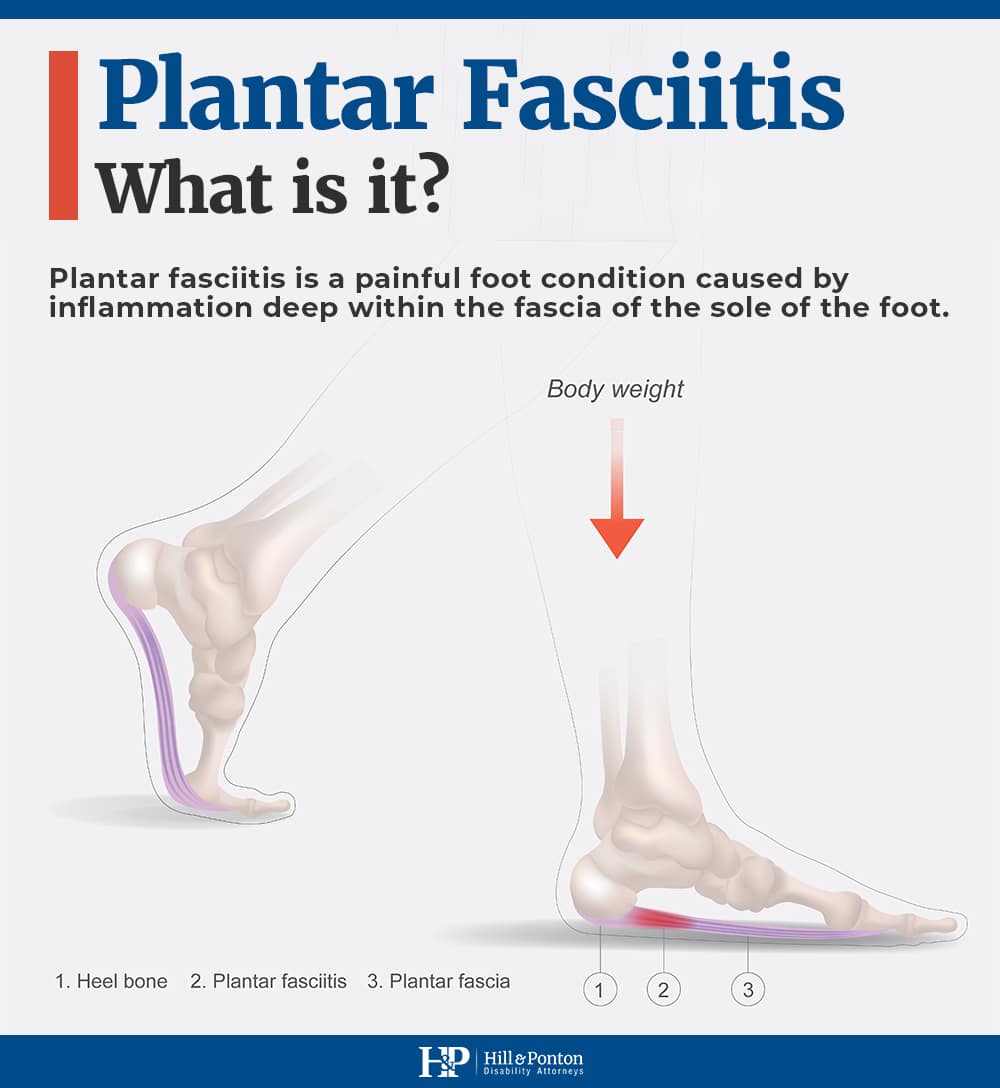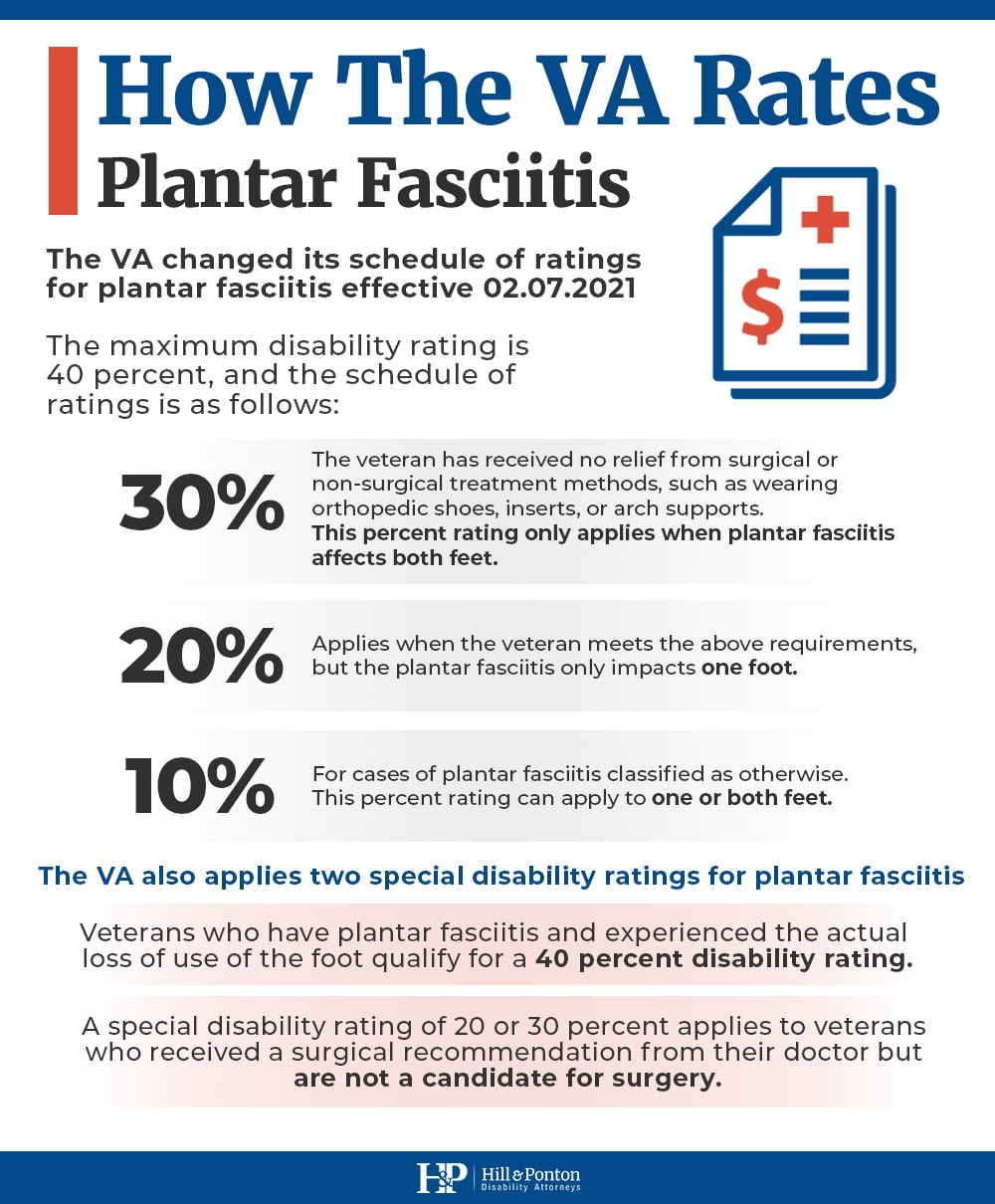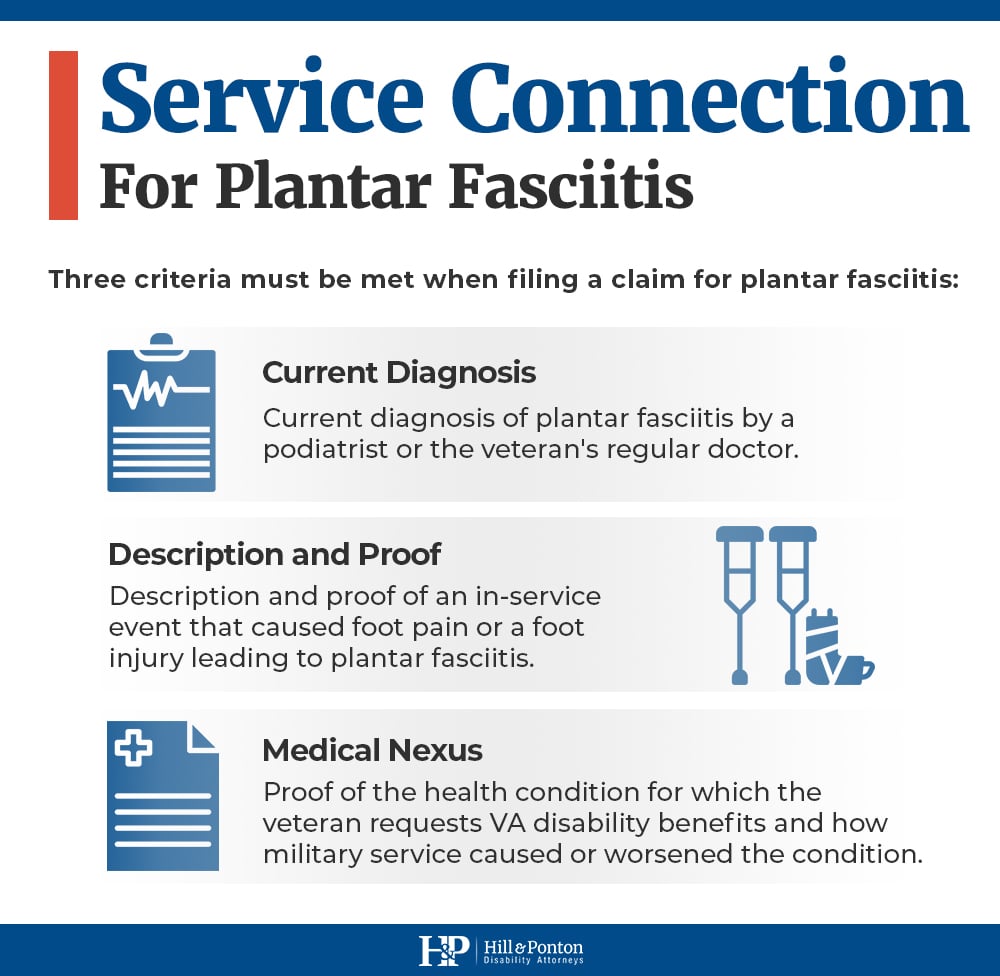Plantar fasciitis is a painful condition that affects the fascia—a thick band of tissue—on the sole of the foot. This condition is sometimes referred to as runner’s heel, painful sole syndrome, or neuritis. Veterans experiencing plantar fasciitis may be eligible for service-connected disability compensation if they can establish a link between their condition and military service.
What is Plantar Fasciitis?

Plantar fasciitis causes pain on the bottom of the foot, often focused on the heel. The severity of the pain can range from mild discomfort to being so debilitating that placing weight on the affected foot becomes impossible. Common symptoms include:
- Tenderness: Felt along the bottom of the foot, especially near the heel.
- Heel Pain: Most severe in the morning and gradually lessens as the day goes on.
- Limited Mobility: Pain may worsen after long periods of standing or walking.
Can Veterans Receive Disability for Plantar Fasciitis?
Yes, veterans can receive VA disability compensation for plantar fasciitis if they can establish a service connection. This involves demonstrating that the condition was caused or worsened during their time in the military. Military service often involves prolonged standing, carrying heavy loads, and wearing unsupportive footwear, making veterans particularly vulnerable to developing plantar fasciitis. According to the Mayo Clinic, the following factors increase the risk of plantar fasciitis:
- Female Gender: Higher prevalence among women.
- Age: Most common in individuals over 40.
- Certain Activities: Exercises like running and aerobic dancing that strain the heel and connective tissue.
- Foot Mechanics: Conditions like flat feet or high arches.
- Obesity: Increased weight adds pressure to the plantar fascia.
- Prolonged Standing: Walking or standing on hard surfaces for extended periods.
(If you’re curious about VA disability ratings for shin splints, check out our guide here!)
VA Disability Ratings for Plantar Fasciitis
As of February 7, 2021, the VA updated its schedule of ratings for plantar fasciitis. The maximum disability rating for this condition is 40%, and ratings are determined based on the severity and impact of the condition:
Standard Ratings for Plantar Fasciitis
- 30%: This rating applies when plantar fasciitis affects both feet and does not respond to either surgical or non-surgical treatment methods, such as orthopedic shoes, inserts, or arch supports.
- 20%: This rating applies when plantar fasciitis impacts only one foot and remains unrelieved by treatment.
- 10%: Assigned for cases of plantar fasciitis classified as “otherwise,” regardless of whether one or both feet are affected.
Special Ratings for Severe Cases
- 40%: Reserved for veterans who have experienced a total loss of use of one or both feet due to plantar fasciitis.
-
20% or 30%: Applicable to veterans who were recommended for surgery but are not candidates for the procedure:
- 20%: For unilateral cases (one foot affected).
- 30%: For bilateral cases (both feet affected).
These ratings reflect the level of functional loss and the extent to which plantar fasciitis impacts daily activities and quality of life. If your condition does not fit neatly into these categories or if your claim was denied, consider appealing for a reevaluation.
Service Connection for Plantar Fasciitis
To qualify for VA disability benefits for plantar fasciitis, the Department of Veterans Affairs (VA) requires veterans to meet the following three criteria:
- Current Diagnosis: A diagnosis of plantar fasciitis from a podiatrist or primary care physician is essential.
- In-Service Event or Incident: Veterans must provide evidence of an event or injury during service that caused or contributed to their plantar fasciitis.
- Medical Nexus: This establishes a direct connection between the in-service event and the current diagnosis.
Military service often involves prolonged periods on foot, marching on rough terrain, or carrying heavy loads—all activities that significantly increase the risk of plantar fasciitis and other foot conditions like pes planus (flat feet) or hallux valgus (bunion). With proper medical documentation, establishing service connection for plantar fasciitis can be straightforward.
Secondary Service Connection for Plantar Fasciitis
Veterans diagnosed with plantar fasciitis after military service may still qualify for disability benefits if the condition stems from or worsens due to a primary service-connected disability, such as:
To secure a secondary service connection, veterans need:
- A Current Diagnosis: The plantar fasciitis diagnosis must be on file with the VA.
- Evidence of a Primary Service-Connected Disability: A previously documented service-connected condition that contributes to plantar fasciitis.
- Medical Nexus: Proof linking the primary service-connected disability to the secondary condition of plantar fasciitis.
For example, if a veteran’s knee injury altered their gait, causing undue stress on the feet and leading to plantar fasciitis, this would establish grounds for a secondary service connection.
Service Connection by Aggravation
Veterans who entered military service with pre-existing heel pain or foot injuries may qualify for service connection by aggravation if their plantar fasciitis worsened due to military duties. This requires:
- Evidence of Aggravation: Medical records showing the pre-existing condition worsened during service.
- Permanent Worsening: Proof that the condition’s progression was due to military service, not the natural course of the disease.
A doctor must provide written confirmation that military service aggravated the condition, leading to a worsening that is beyond natural progression.
Compensation and Pension Exams (C& P Exams) for Plantar Fasciitis
When the Department of Veterans Affairs (VA) needs more information to evaluate a disability claim, it may require the veteran to undergo a Compensation and Pension (C&P) exam. This exam helps determine if a condition like plantar fasciitis is service-connected and assess the severity of the disability to assign an appropriate rating.
What to Expect During a C&P Exam
For plantar fasciitis, the C&P exam typically includes:
- Physical Examination: The doctor will assess each foot, checking for tenderness, swelling, or other symptoms.
- X-Rays: Imaging may be used to confirm the diagnosis and identify any related conditions, such as calcified heel spurs.
- Symptom Discussion: The veteran should be prepared to describe how plantar fasciitis impacts their daily life, including limitations on walking, standing, or performing other activities.
Accessing C&P Exam Records
Veterans have the right to request a copy of their medical records from the C&P exam, especially if the results are unfavorable for establishing a service connection. These records can be vital for understanding the VA’s decision and preparing for an appeal if necessary.
Next Steps After an Unfavorable Result
If the VA denies your claim or assigns a lower-than-expected rating, the next step is to file an appeal. The VA will include information on how to appeal in its decision letter. Reviewing the exam records and gathering additional evidence, such as statements from other medical providers or lay evidence, can strengthen your case during the appeal process.
Veterans should not feel discouraged by an initial unfavorable decision, as the appeal process provides another opportunity to secure the benefits they deserve.
TDIU for Plantar Fasciitis
TDIU, or Total Disability Individual Unemployability, allows veterans to receive compensation at the 100% disability rate if they are unable to maintain substantially gainful employment due to service-connected conditions.
Because the maximum VA disability rating for plantar fasciitis is 40%, veterans seeking TDIU must rely on additional service-connected conditions to meet the eligibility requirements. Specifically:
- Veterans must have a combined disability rating of at least 70%, with at least one condition rated at 60% or higher to qualify for TDIU.
- If plantar fasciitis contributes significantly to a veteran’s inability to work, it can be included in the overall evaluation when combined with other service-connected disabilities.
Veterans whose plantar fasciitis and related conditions prevent them from working should consider applying for TDIU to ensure they receive the full compensation they deserve. Be prepared to provide medical evidence and employment records that demonstrate how your conditions impact your ability to maintain gainful employment.
Denied or Underrated for Plantar Fasciitis? We Can Help.
Navigating the VA disability claims process can be frustrating, especially when dealing with denials or low ratings for conditions like plantar fasciitis. At Hill & Ponton, we specialize in helping veterans fight for the benefits they deserve.
If your VA disability claim was denied or your rating doesn’t reflect the severity of your condition, let us help you take the next step. Contact us for a free, no-obligation case evaluation today and see how we can assist in your appeal.







